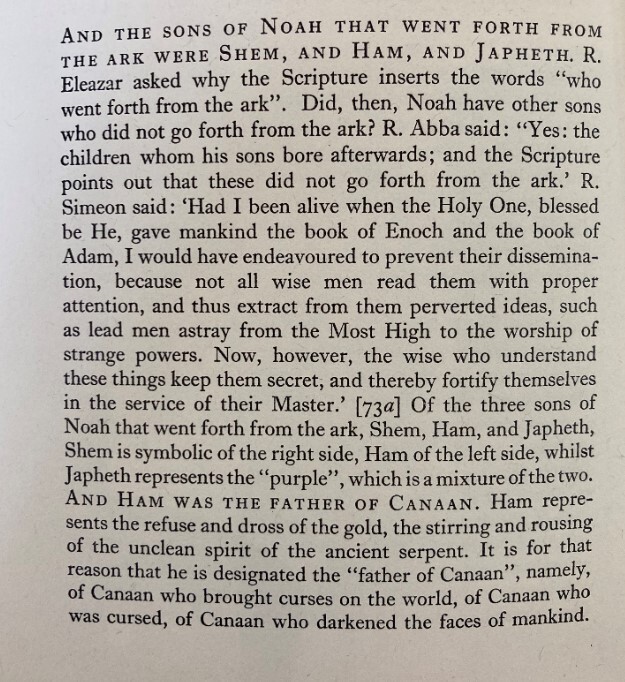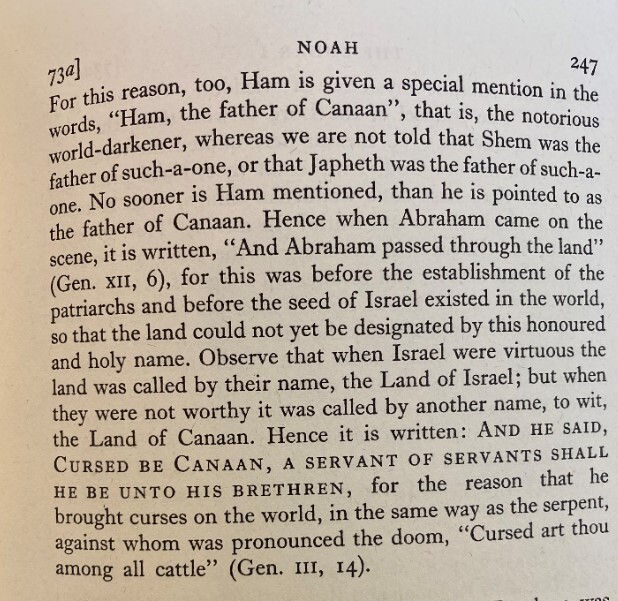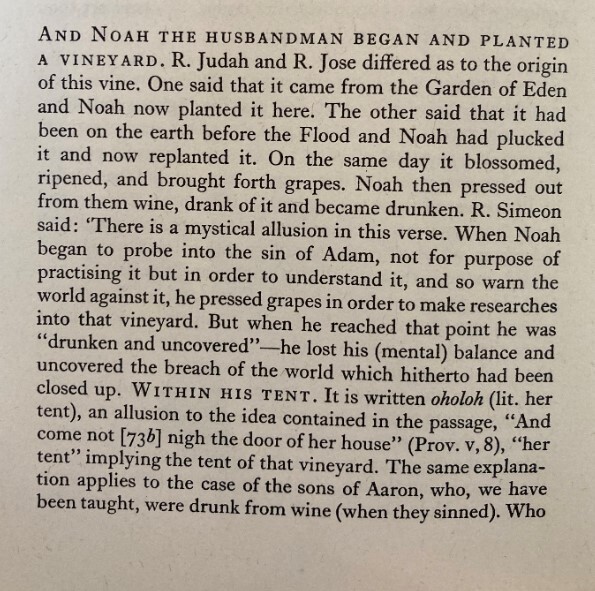HS and MS offer translation re: Ham.
- Type
- Book
- Source
- Unknown Non-LDS
- Hearsay
- 3rd HandLate
- Reference
The Zohar 5 vols., trans. Harry Sperling and Maurice Simon (London: The Soncino Press, 1934), 1:246-248
- Scribe/Publisher
- Soncino Press
- People
- Harry Sperling, Unknown, Maurice Simon
- Audience
- Reading Public
- Transcription
AND HAM WAS THE FATHER OF CANAAN. Ham represents the refuse and dross of the gold, the stirring and rousing of the unclean spirit of the ancient serpent. It is for that reason that he is designated the “father of Canaan”, namely, of Canaan who brought curses on the world, of Canaan who was cursed, of Canaan who darkened the faces of mankind. For this reason, too, Ham is given a special mention in the words, “Ham, the father of Canaan”, that is, the notorious world-darkener, whereas we are not told that Shem was the father of such-a-one, or that Japheth was the father of such-a-one. No sooner is Ham mentioned, than he is pointed to as the father of Canaan. Hence when Abraham came on the scene, it is written, “And Abraham passed through the land” (Gen. XII, 6), for this was before the establishment of the patriarchs and before the seed of Israel existed in the world, so that the land could not yet be designated by this honoured and holy name. Observe that when Israel was virtuous the land was called by their name, the Land of Israel; but when they were not worthy it was called by another name, to wit, the Land of Canaan. Hence it is written: AND HE SAID, CURSED BY CANAAN, A SERVANT OF SERVANTS SHALL HE BE UNTO HIS BRETHREN, for the reason that he brought curses on the world, in the same way as the serpent, against whom was pronounced the doom, “Cursed art thou among all cattle” (Gen. III, 14).
AND NOAH THE HUSBANDMAN BEGAN AND PLATED A VINEYARD. R. Judah and R. Jose differed as to the origin of this vine. One said that it came form the Garden of Eden and Noah now planted it here. The other said that it had been on the earth before the Flood and Noah had plucked it and now replanted it. On the same day it blossomed, ripened, and brought forth grapes. Noah then pressed out from them wine, drank of it and became drunken. R. Simeon said: ‘There is a mystical allusion in this verse. When Noah began to probe into the sin of Adam, not for purpose of practising it but in order to understand it, and so warn the world against it, he pressed grapes in order to make researches into that vineyard. But when he reached that point he was “drunken and uncovered”—he lost his (mental) balance and uncovered the breach of the world which hitherto had been closed up. WITHIN HIS TENT. It is written oholoh (lit. her tent), an allusion to the idea contained in the passage, “And come not [73b] nigh the door of her house” (Prov. v, :sunglasses:, “her tent implying the tent of that vineyard. The same explanation applies to the case of the sons of Aaron, who, we have been taught, were drunk from wine (when they sinned). Who then, gave them wine at that place to drink? And it is conceivable that they would dare to get drunk at such a time? But in reality the wine which made them drunk was this same wine of Noah, as it is written, “and they offered strange fire before the Lord” (Lev. X, 1), an analogous term to which is found in the passage, “That they may keep thee from the strange woman” (Prov. VII, 5): all these terms allude to one and the same thing. The same sense, then, underlies the verse, “And he drank of the wine and was drunken, and was uncovered within his tent.” This, as explained, was observed by Ham, the father of Canaan, and Canaan seized the opportunity to work his will by removing from that righteous man the mystical symbol of the covenant; for this, according to tradition, is what he did. Therefore Noah said, CURSED BE CANAAN, since through him the curse returned to the world. A SLAVE OF SLAVES HE SHALL BE: these words correspond to those addressed to the serpent: “cursed art thou from all cattle, etc.” (Gen. III, 14). Hence, while all others will be saved in the world to come, he will not be saved; all others will obtain their freedom, but not he. This is a mystery known to the adepts in the way and paths of the Torah.’
- Citations in Mormonr Qnas
The B. H. Roberts Foundation is not owned by, operated by, or affiliated with the Church of Jesus Christ of Latter-day Saints.



